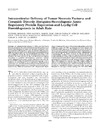Please use this identifier to cite or link to this item:
https://accedacris.ulpgc.es/jspui/handle/10553/48292
| Title: | Intratesticular delivery of tumor necrosis factor-alpha and ceramide directly abrogates steroidogenic acute regulatory protein expression and Leydig cell steroidogenesis in adult rats | Authors: | Morales, Victoria Santana, Pino Díaz, Raquel Tabraue, Carlos Gallardo, Germán López Blanco, Félix Hernández, Inmaculada Fanjul Rodríguez, Luisa Fernanda Ruiz De Galarreta, Carlos M. |
UNESCO Clasification: | 230221 Biología molecular 2403 Bioquímica 320502 Endocrinología |
Keywords: | Cultured Granulosa-Cells Levels In-Vivo Testicular Macrophages Injected Interleukin-1-Beta Proinflammatory Cytokines, et al |
Issue Date: | 2003 | Journal: | Endocrinology (Philadelphia) | Abstract: | Systemic or intratesticular release of TNFα and IL1β have been implicated in the reduced testosterone biosynthesis and impaired production of competent spermatozoa found in human patients suffering from sepsis or chronic inflammation. Although in vitro and in vivo studies have demonstrated that TNFα and IL1β intercept the hypothalamic-pituitary testis axis at different levels, the site(s) of action and relative contribution of each cytokine to the overall testicular failure associated to systemic inflammatory processes remains poorly defined. In this study we show that intratesticular delivery of TNFα induced a rapid (4 h) and sustained (up to 24 h) reduction in steroidogenic acute regulatory (StAR) protein expression and testosterone biosynthesis in nonstimulated or human chorionic gonadotropin-treated intact or hypophysectomized rats. Bilateral treatment with cell-permeant short-chain ceramides (C2-cer or C6-cer) reproduced the early (4 h) inhibitory action of TNFα on testosterone biosynthesis and testicular StAR expression. The inhibitory action of C2-cer or C6-cer was not observed in animals treated with inactive analogs (dihydroceramide), phosphorylcholine, sphingosine, or sphoingosine-1P. In sharp contrast to the previously described ability of IL1β to prevent human chorionic gonadotropin-stimulated Leydig cell steroidogenesis in vitro, serum testosterone and testicular StAR protein expression remained unchanged in animals bilaterally injected with this cytokine. These data support the concept that TNFα triggers different effector mechanisms to directly inhibit Leydig cell StAR expression and steroidogenesis, which ultimately contribute to the global reproductive failure associated with chronic inflammation and sepsis. | URI: | https://accedacris.ulpgc.es/handle/10553/48292 | ISSN: | 0013-7227 | DOI: | 10.1210/en.2003-0569 | Source: | Endocrinology, [ISSN 0013-7227], v. 144 (11), p. 4763-4772 |
| Appears in Collections: | Artículos |
SCOPUSTM
Citations
59
checked on Jun 8, 2025
WEB OF SCIENCETM
Citations
52
checked on Feb 15, 2026
Page view(s)
153
checked on May 31, 2025
Download(s)
104
checked on May 31, 2025
Google ScholarTM
Check
Altmetric
Share
Export metadata
Items in accedaCRIS are protected by copyright, with all rights reserved, unless otherwise indicated.
